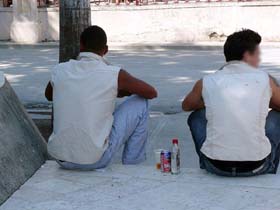
February 12, 2008
Work: Option or Necessity?
While the International Labor Organization warns of more unemployment in the world, there are vacancies in Cuba and even people who can afford to wait for “attractive” options.
PASTOR BATISTA VALDÉS
The time is exactly 10:00 on a Wednesday morning, and the day looks as if it were Sunday. Although thousands of Las Tunas residents are at their jobs, part of the population scours the shops and walks down the streets of the urban center; others queue to buy ice cream, speak among themselves or sit placidly on a park bench.
IMAGES THAT DON’T EXACTLY PROJECT EMPLOYED WORKERS.
Others, as intermediary links on the chain, sell vegetables, which they certainly didn’t sweat to produce; and there are those who —at close range or surrounded by a veil of mystery— offer people to buy hard currency, or jeans, underwear, tennis shoes, furniture, etc.
It seems there’s massive vacation. Could it be bad labor discipline at some work places or are all those people living without working? Are the sources of employment exhausted?
Statistics at the Ministry of Labor’s provincial office help to find answers to these questions. A survey on the issue (carried out at the end of 2007), placed eastern Las Tunas province among those with the lowest unemployment rate: only 0.5% of those requesting jobs remain unemployed.
THIS SUNDAY ENVIRONMENT IS CREATED EVERY DAY DURING WORKING HOURS.
It’s contradictory though, that this province has a very low occupation rate —scarcely 65.7% of the economically active population (lower than national average) is working.
There are plenty of opportunities to work, affirms the Ministry of Labor’s provincial representative Deibys Garcia. At present, we have almost 6,000 vacancies ready to be filled, in all categories: professionals, administrative assistants, public services, technicians, etc.
The need of a labor force in the province is a fact. Ministries such as those of Agriculture and Sugar (historically a major employment source and still demanding workers) require no less than a thousand workers to fill vacancies, without including the unlimited horizon for new positions if there were enough means and conditions to recover and incorporate production areas that have been lost.
NECESSITY OR “ATTRACTION?”
The truth is that agriculture and construction jobs in other production sectors are seen as “non-attractive options,” because they are not stimulated enough.
Many people who don’t work or contribute anything to society can afford to select, choose and take only proposals that are more “tempting” to them.
That explains why the civil engineering enterprises are short almost one hundred builders, carpenters, plumbers, fitters, boilermakers, water-proofers and even legal consultants, in spite of the information and promotion offered in the media, explains Jose Borrero, director of human resources.
Lenin Mora, a specialist in the home construction micro-brigades, is concerned about how to face the challenge of restoring and preserving buildings if, during 2007, they worked with only 54 percent of the labor force they require. He notes that besides people with basic skills, he also needs engineers, architects and technicians.
Laury Laguna (human resources at the local education office) says the situation deserves special attention because “sectors like ours require custodians, bookkeepers, and other jobs including teachers. Today there are a lot of young people teaching that have not themselves graduated in order to meet the deficit. If someone isn’t studying or working it is because they don’t want to because the classrooms are open and both study and job offers exist even in the most remote areas.”
According to surveys, some 14,000 people neither work nor study in Las Tunas province. Those who live in rural areas can perhaps point to few job choices or the real lack of tools for agricultural activities. But in the city, it’s not exactly like that. More than 800 retirees have occupied posts unwanted by younger people.
Is it that —unlike what millions of inhabitants around the globe— these persons don’t feel or have the need to work? How do they make a living? From their parents’ money, remittances, shady businesses with resources and tricks that bleed the same State that provides them with basic foodstuffs, medical services, safety, studies, and identical rights as the rest of society?
MORE COURAGE AND VALUES
More decisiveness and virtues are needed for this tendency to stop proliferating in the country.
Families play a decisive role, but they can’t be alone in this endeavor. During my childhood (I was born after 1959) fathers felt embarrassed when they had lazy sons, and neighborhoods were worried about those youngsters. And perhaps job options weren’t as many as today’s.
Those were days in which the concept “work: a right and a duty for the people,” was often heard. Could it be that for some people that maxim has lost its meaning?
Persuasion is an excellent tool to show, argue, and convince. And when it is not enough, it can be accompanied by insistence and rigor, although, undoubtedly, economic measures will also be necessary to revert these tendencies.
Many citizens expressed this feeling at meetings held after the speech delivered in the eastern province of Camagüey by First Vice President Raul Castro, on July 26, 2007, convinced that living on what other people earned by the sweat of their brows is one of the things that should be changed to make the Cuban revolution more equitable and efficient.
No to lack of discipline:
The National Commissions of Football and Basketball analyzed the incidents of last Saturday in the National Championship and Superior League, respectively.
These evaluations agreed that in both cases, they were actions against order, discipline and values that characterize Cuban sports and against a sport that our people deserve. Consequently, it became necessary to apply a group of disciplinary measures as established by the rules that are, as following:
NATIONAL FOOTBALL CHAMPIONSHIP
- Declare the defeat of Camagüey against Havana, with a score of three goals to zero.
- Deny the right to participate in national and international championships, for two years, of the technical director of Camagüey, Armando Cruz and a team player, Héctor Portal.
SUPERIOR BASKETBALL LEAGUE
- Separate for the duration of the tournament the provincial commissioner of Matanzas, Rogelio Prince.
- Separate for two sub series (4 games) the provincial delegate of Matanzas, Michel Boza and athlete Yasmani Herrera.
- Separate for one sub series the athlete of Capitalinos, Luis Álvarez Fumero
http://www.granma.cubaweb.cu/2008/02/12/nacional/artic01.html
http://www.granma.cubaweb.cu/2008/02/12/deportes/artic02.html
|
 Imágenes así no transmiten precisamente una sensación de
vínculo laboral.
Imágenes así no transmiten precisamente una sensación de
vínculo laboral. El
ambiente de domingo se presenta diariamente en horario
de trabajo.
El
ambiente de domingo se presenta diariamente en horario
de trabajo.